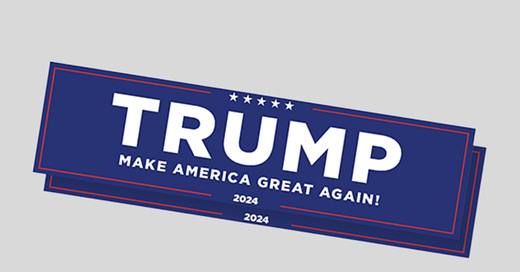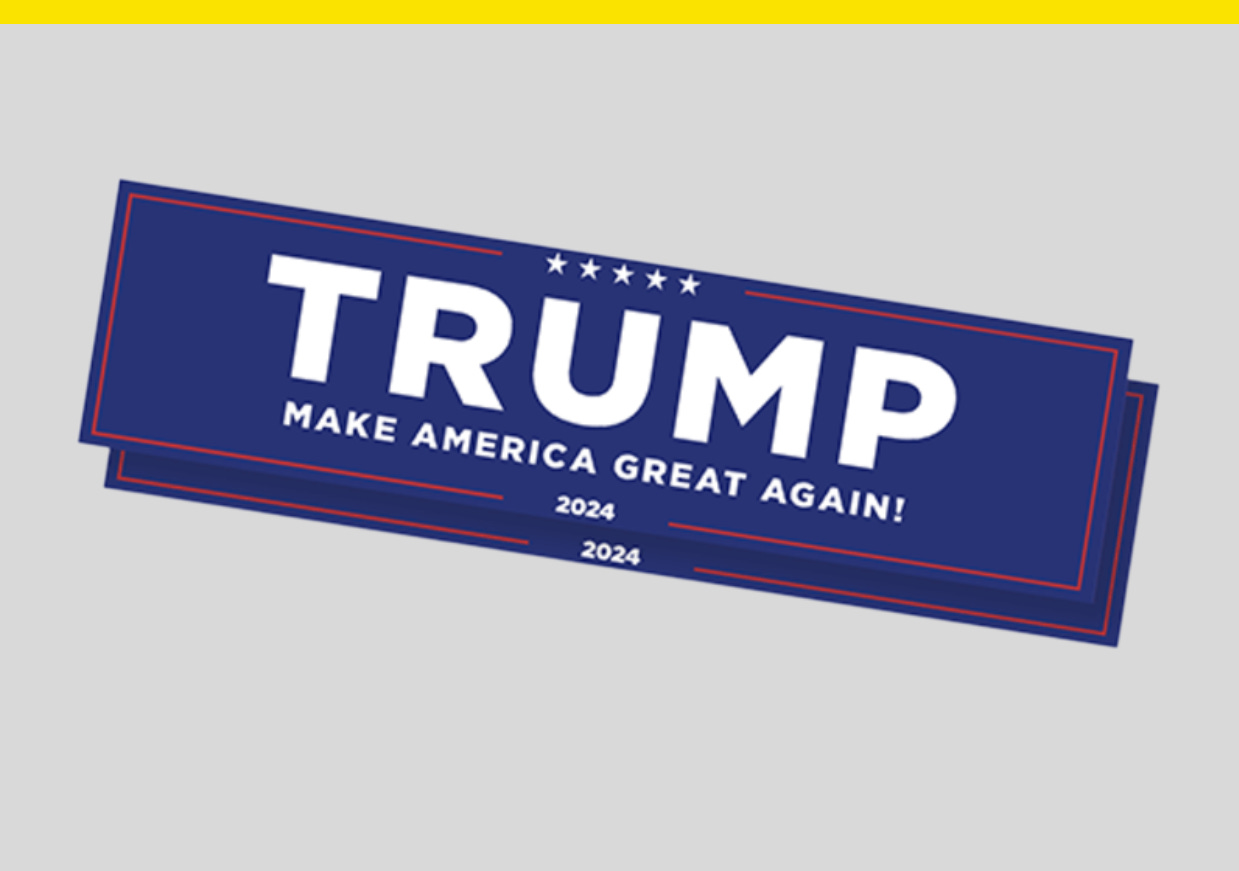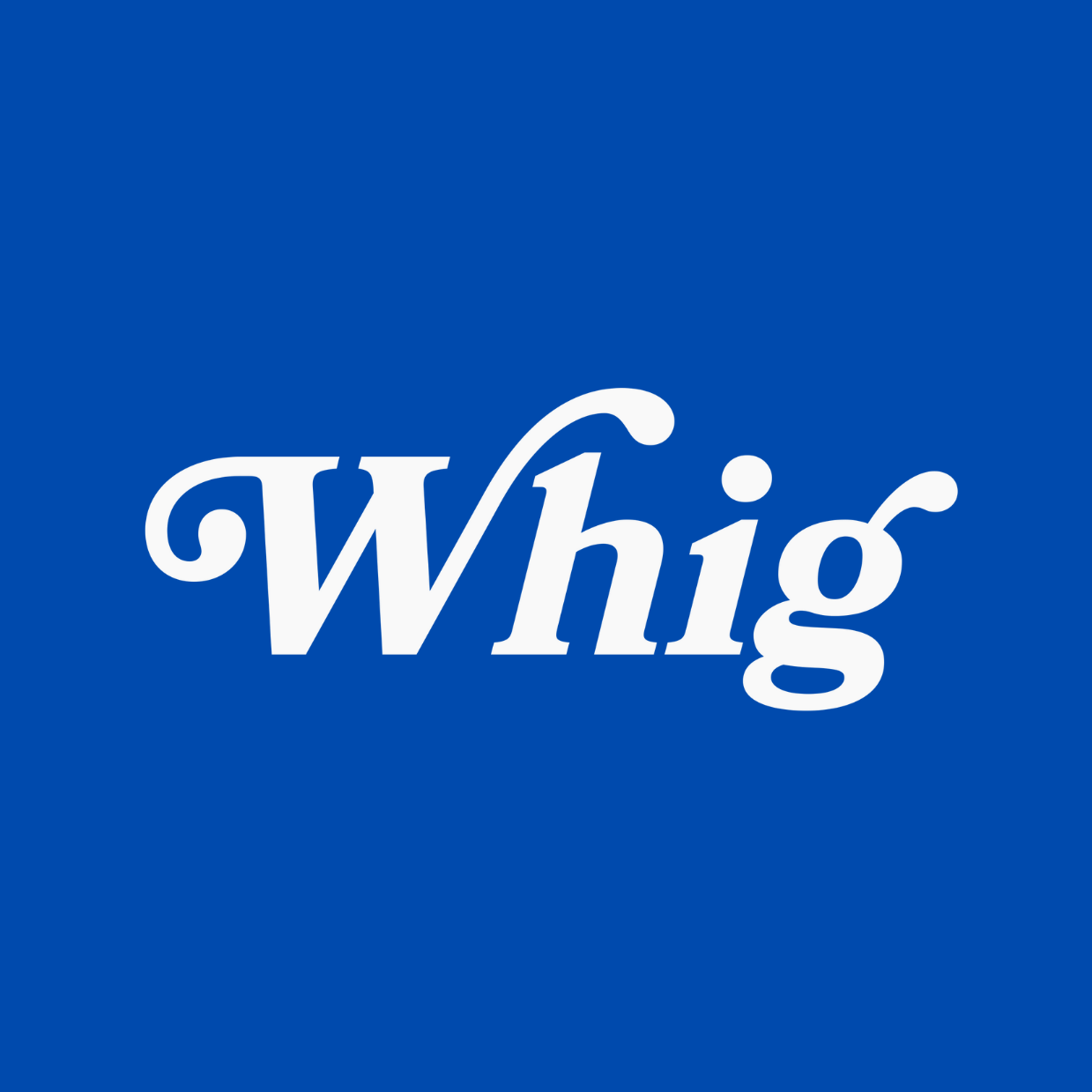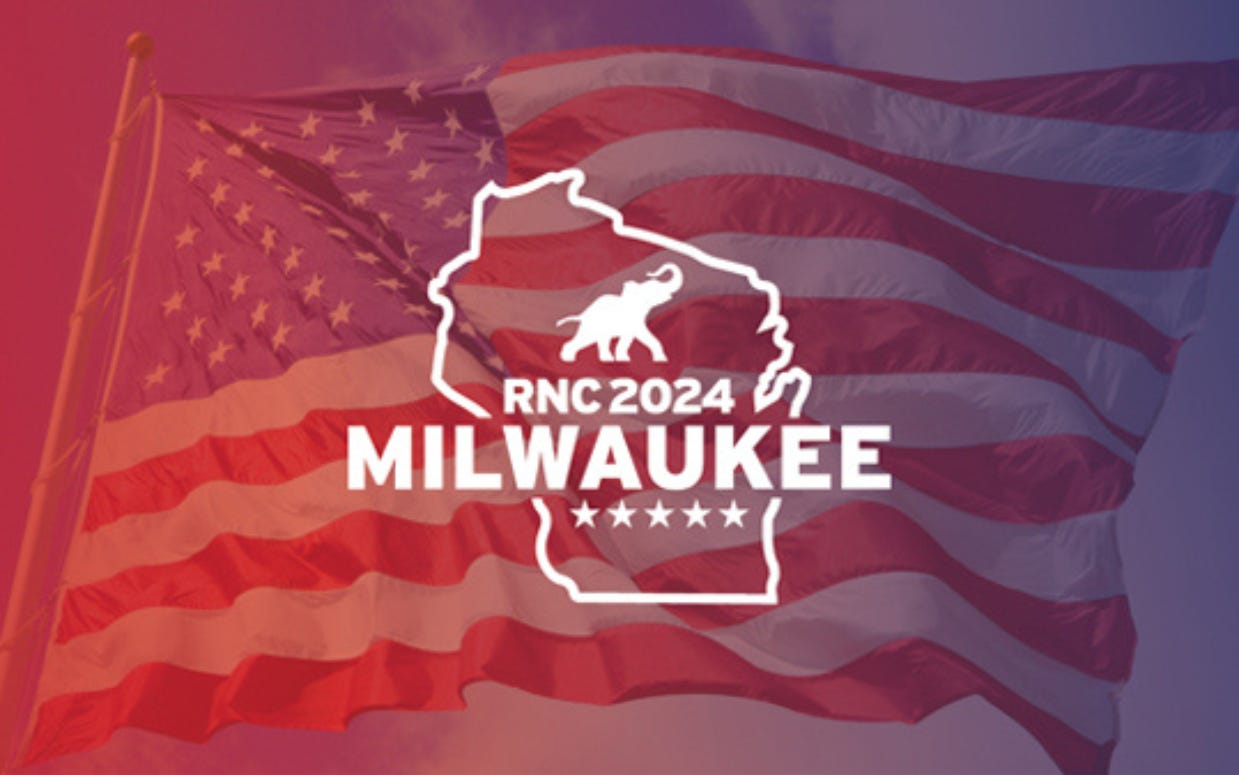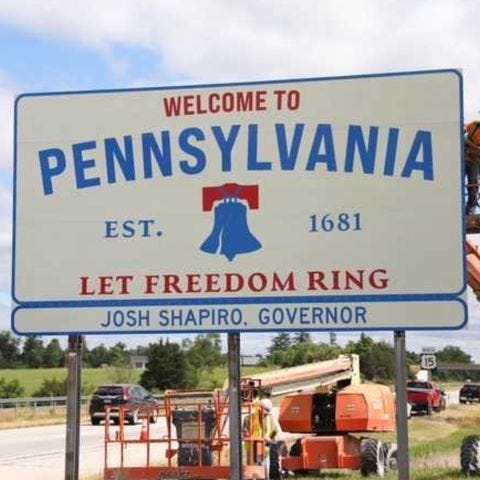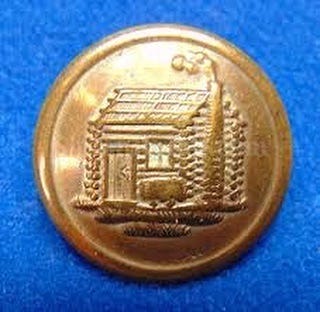How the Trump campaign is building a new coalition for 2024
Plus: The theme of the Republican National Convention will be “Make America Great Once Again”
Hello, in this issue we’ll look at…
How the Trump campaign is building a new coalition for 2024
The theme of the Republican National Convention will be “Make America Great Once Again”
The world of digital political ads is a hellscape of scams and misinformation, research shows
Scroll to the end to see: Pennsylvania’s new state welcome sign 🔔
How the Trump campaign is building a new coalition for 2024
The Trump campaign is hoping to assemble a new coalition of voters in 2024 to do what it couldn’t four years ago: beat President Joe Biden. And not by a little, by a lot.
Rather than relying on a past Republican presidential campaign playbook that called for sheer volume of voter contacts, former President Donald Trump’s campaign this time around is trying something different, according to the Atlantic. They’re focusing on reaching low-propensity Trump supporters with boots on the ground while reaching persuadable swing voters with targeted paid ads, and they’re not going after the persuadable voters you may think.
Trump’s team has also narrowed the states they’re competing in to a handful of swing states (or “basically running four or five Senate races,” as Beth Myers, a former senior adviser to Sen. Mitt Romney’s (R-Utah) 2012 presidential campaign diagnosed it in the story). With that formula against a candidate they see as weak, Trump’s top advisers believe they can win in a blowout.
The seeds of Trump’s general election strategy were planted during the Iowa caucus, when Trump advisers Chris LaCivita and Susie Wiles identified about 8,000 Iowans who seemed Trump friendly but unlikely to vote. These people had either engaged with the campaign online, in the mail, or physically, but they weren’t registered to vote.
After these low-propensity Trump voters were identified and contacted, they were trained to organize Trump supporters in their precincts for the caucus, given gold-embroidered hats, called “caucus captains,” and given a list of 10 other low-propensity Trump voters in their area to contact. The result was Trump won a contested Iowa caucus for the first time in his political career.
“Our opponents were spending tens of millions of dollars paying for voter contacts for people to knock on doors,” LaCivita said. “And we were spending tens of thousands printing training brochures and pretty hats with golden embroidery on them.”
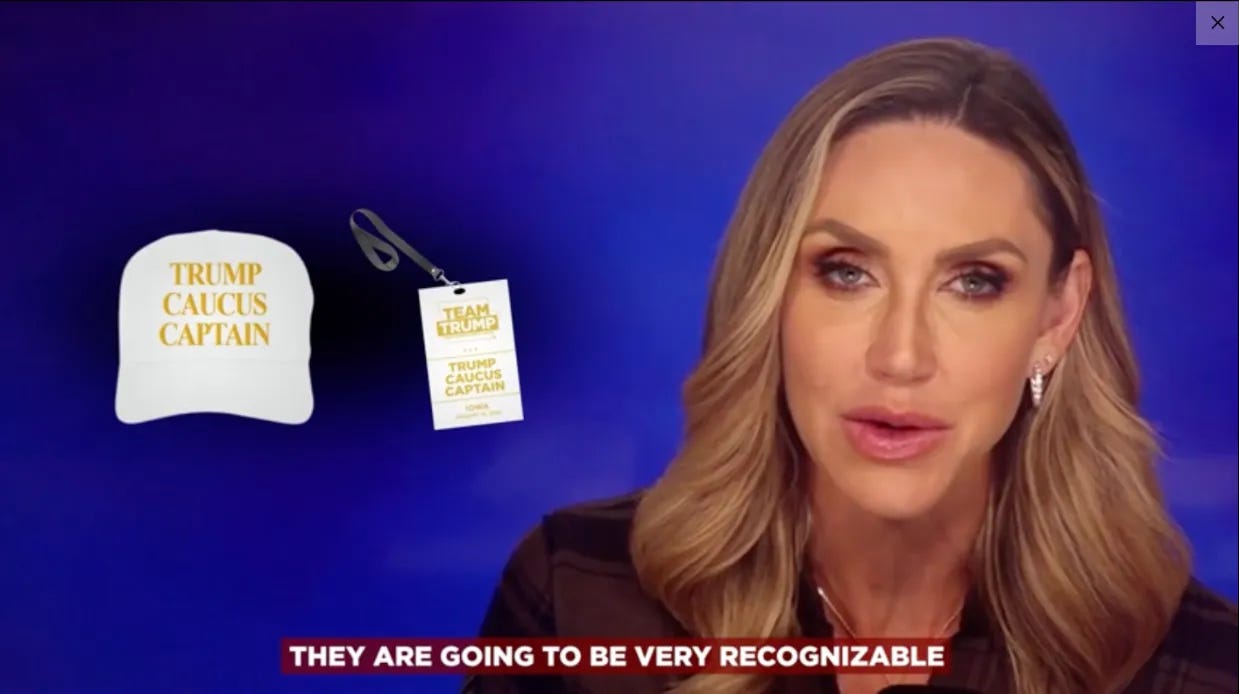
The campaign’s plan is now to scale that strategy and recruit between 5,000 and 10,000 volunteers in seven swing states to contact Trump-friendly voters who would otherwise not be likely to turn out to vote. Those states are Arizona, Georgia, Michigan, Nevada, North Carolina, Pennsylvania, and Wisconsin.
As for persuadable swing voters, the campaign’s plan to reach them isn’t necessarily by knocking on doors, but instead through targeted paid advertising. The Trump campaign has identified groups including college-educated women, working-class Latinos, and urban Black men under 40 as key demographic groups they’re planning to persuade with paid TV and online ads.
Outside groups supporting Trump are similarly focused on hyper-targeted advertising in just a few swing states. And the Trump campaign has outsourced some of its canvasing to outside groups like Turning Point Action.
“It’s so targeted, we’re not fighting for Black people,” Wiles said. “We’re fighting for Black men between 18 and 34.” An unnamed Trump ally put it this way, per the Atlantic, “For every Karen we lose, we’re going to win a Jamal and an Enrique.”
Wiles agreed with that view to a point. “We’re realigning the party,” she said. “And I don’t think we’re gonna lose all the Karens, either.” LaCivita said he expects the race to be an “extraordinarily visual” contest that contrasts Trump’s strength with Biden’s weakness.
A message from Yello Media:
Politics in the front, pop culture in the back.
My new newsletter about politics and pop culture takes its name from America’s long-lost political party. The Whigs carnivalized politics and turned campaigns into a party. They held big parades with log cabins on wheels and slogan balls, served hard cider to supporters, and sought to portray their leaders as heirs to George Washington. If politics today seems like a circus, well, we have the Whigs to thank.
Subscribe to Whig today to get my new free newsletter about politics and pop culture delivered each week:
The theme of the Republican National Convention is “Make America Great Once Again”
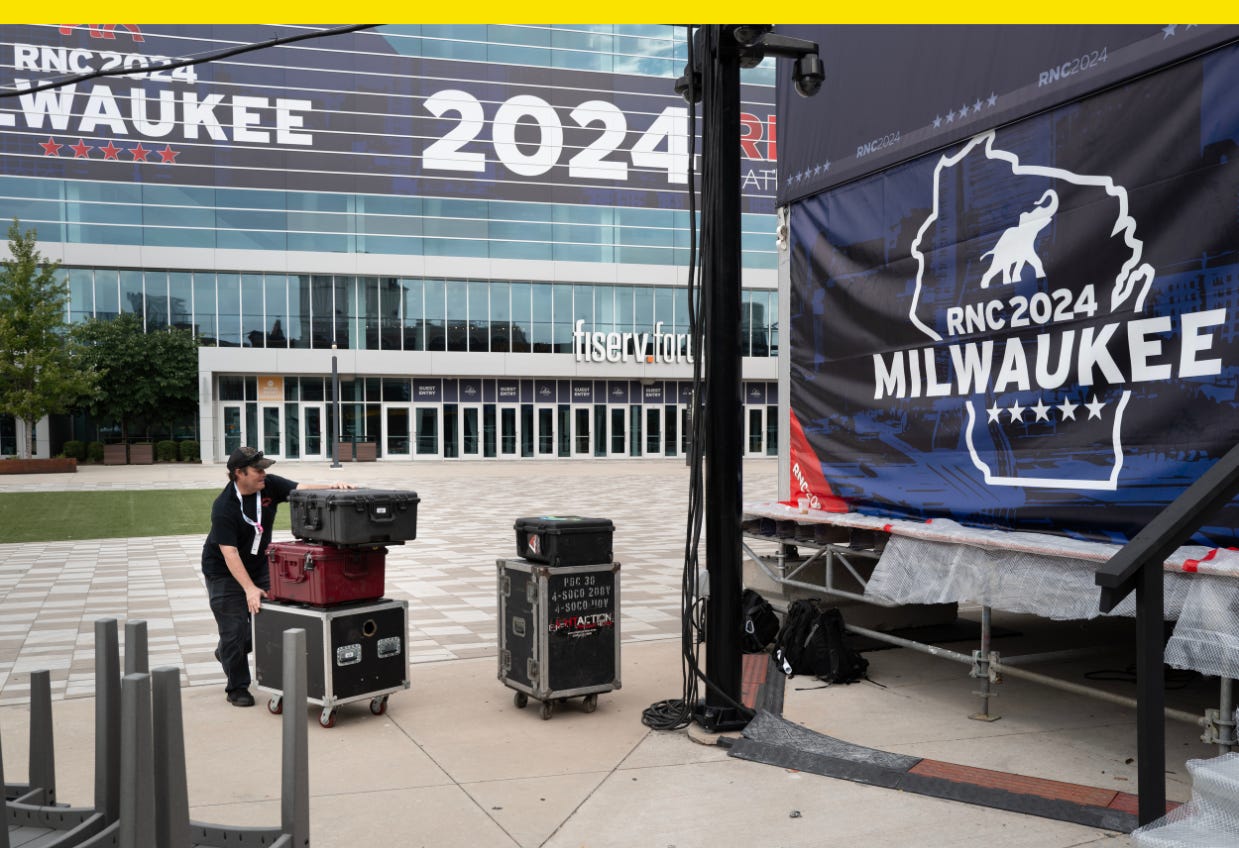
MAGOA.
When Republicans gather in Milwaukee next week for the 2024 Republican National Convention over the course of four days from July 15 to 18, their theme will be a take on Trump’s longtime slogan.
The Trump campaign announced this week that each day of the convention will have a different focus. Monday will be “Make America Wealthy Once Again,” Tuesday will be “Make America Safe Once Again,” Wednesday will be “Make America Strong Once Again,” and the closing day on Thursday will be “Make America Great Once Again.”
(Republicans did something similar during their 2016 convention with the themed days “Make America Safe, Work, First, and One Again.”)
“The 2024 Republican National Convention will showcase President Trump’s vision to turn our country around and launch our America First movement to victory come November,” Trump campaign senior advisors Susie Wiles and Chris LaCivita said in a joint statement announcing the program.
Donald Trump Jr. is reportedly scheduled to speak on the second-to-last night before his father’s to-be-announced running mate, and Dana White, president of Ultimate Fighting Championship, or UFC, is reportedly scheduled to speak on the final night before Trump’s acceptance speech.
Other expected speakers include model and television personality Amber Rose, who said on social media she’s speaking at the convention, and Florida Gov. Ron DeSantis. RNC co-chair Lara Trump said earlier this week, “I think you'll also hear from unlikely people, celebrities who maybe you've never heard from who support Donald Trump and support conservative values and the Republican Party.”
The world of digital political ads is a hellscape of scams and misinformation, research shows
Weak regulations around digital advertising and interest in politics online has made digital ads a perfect avenue for scammers, according to research published by the ElectionGraph Project at Syracuse University’s Institute for Democracy, Journalism & Citizenship.
Surveying more than 2,000 Facebook and Instagram groups that ran ads that mentioned presidential candidates between last September until this May, researchers found that some “inauthentic actors” post false and misleading information while other pages are more “focused on obtaining partisans’ credit card information than informing or activating voters.”
While a majority of these Facebook and Instagram groups appear to be legitimate, “several display questionable attributes or markers of scams,” the report’s authors wrote. “One is a cluster of pages with different names that contain words such as ‘prayers’ and ‘heritage’ and Facebook pages that appear disconnected but share common features such as administrator email addresses, telephone numbers, or URLs. Another network identified is comprised of group names with variations on themes of ‘liberty’ and has spent over $1.5 million on ads. Combined, these groups seem to have ties to financial or health benefit scams and Pro-Trump ‘MAGA’ (Make America Great Again) ‘swag’ (e.g. hat, flag, coin) scams.”
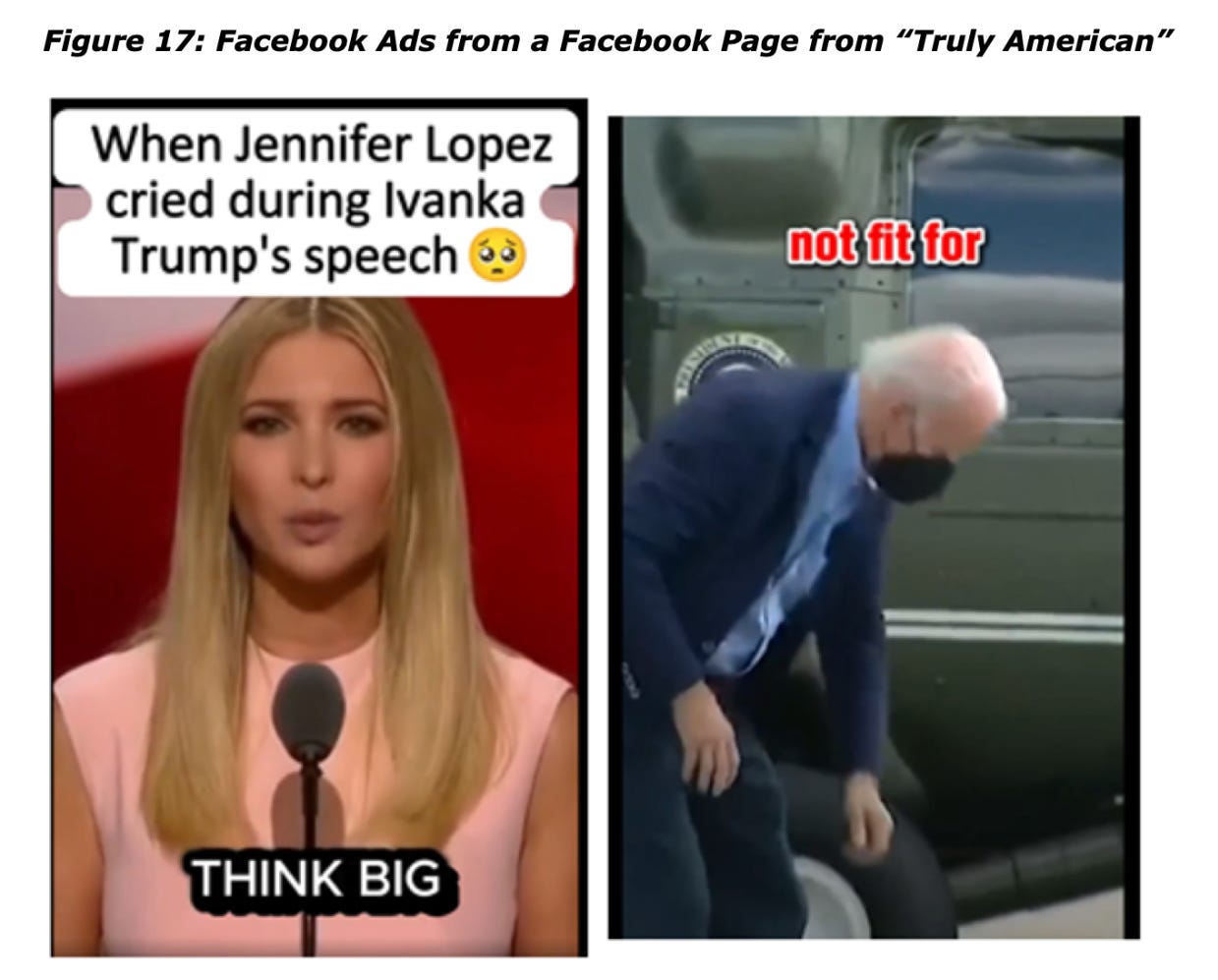
The study found that these ads were more likely to target women than men and more likely to target the old than the young. While both conservatives and liberals were targeted, researchers found conservative-leaning pages spent about $8.6 million on ads to reach 599 million impressions, which was more than the $6.5 million estimated to have been spent by liberal-leaning pages to reach 283 impressions.
Researchers found examples of pages like “Truly American” that ran ads that selectively edited videos to show celebrities appear to be crying at speeches given by former first lady Melania Trump or Ivanka Trump, or selectively edited videos of Biden looking old or lost. (see images above).
Other pages ran ads with health benefits scams, faked news reports, or ads that falsely claimed to be able to deliver government subsidies. Pages targeting liberals focused on health, social and cultural issues, and women’s issues including abortion rights, the report said.
Have you seen this?
Trump allies view Biden’s press conference as “best of both worlds.” They say Biden performed well enough to stave off calls to drop out but managed to provide campaign ad fodder. [Politico]
Pennsylvania is rolling out these new “Let Freedom Ring” license plates and state welcome signs. The new branding comes with a new state tourism campaign, “Pennsylvania: The Great American Getaway.” [yellopolitics/Instagram]
The new Paramount logo is the fleece vest of entertainment logos. Merging media conglomerates are worth billions of dollars, but a new visual identity isn’t always a top concern when two companies become one. [Fast Company]
Nirvana and Marc Jacobs settle smiley face logo lawsuit. Lawyers for Nirvana had claimed that the fashion company improperly tried to associate itself with the grunge band. [Pitchfork]
There’s a new wave of Biden attack ads on the horizon and they’re about to hit. Following next week’s Republican National Convention, a pro-Trump super PAC is prepared to air $61 million worth of attack ads on TV and online hitting Biden. [Yello]
History of political design
Brought to you by Whig, my new newsletter about politics and pop culture. Subscribe here.
William Henry Harrison “Log Cabin” button (1840). This button shows a barrel and log cabin on the front, which were Whig symbols after Harrison’s critics said he was too old to run for president. A critical newspaper columnist in Baltimore wrote, “Give [Harrison] a barrel of hard cider, and settle a pension on him… he will sit the remainder of his days in his log cabin by the side of the fire and study moral philosophy.” Harrison’s supporters turned the attack into a badge of honor, putting log cabins and cider barrels on items like handkerchiefs and buttons in support of his candidacy.
Like what you see? Subscribe for more:

